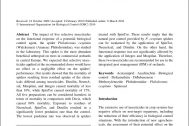Rok
2010Autoři
RNDr. Milan Řezáč, Ph.D.prof. Mgr. Stanislav Pekár, Ph.D.
Druhy
Philodromus cespitum (Walckenaer, 1802) ESObsah
Abstract The impact of five selective insecticides on the functional response of a potential biological control agent, the spider Philodromus cespitum (Walckenaer) (Araneae: Philodromidae), was studied in the laboratory. This spider is the most abundant beneficial arthropod on trees in commercial orchards in central Europe. We expected that selective insecticides applied at the recommended doses would have no effect or a negligible effect on the spiders’ performance. Our results showed that the mortality of spiders resulting from residual uptake of the chem- icals differed among insecticides. Dimilin, NeemAzal, Mospilan, and Integro caused mortality of less than 10%, while SpinTor caused mortality of 17%. All five preparations can be considered harmless in terms of mortality in comparison with Decis, which caused 80% mortality. Exposure to residues of NeemAzal, SpinTor, and Dimilin resulted in a significantly lower predation rate than the control. The lowest predation rate was observed in spiders treated with SpinTor. These results imply that the natural pest control provided by Philodromus cespitum spiders can be weakened by the application of SpinTor, NeemAzal, and Dimilin. On the other hand, the functional response was not significantly affected by the application of Integro and Mospilan. Therefore, these two insecticides are recommended for use in the integrated pest management (IPM) of orchards.



